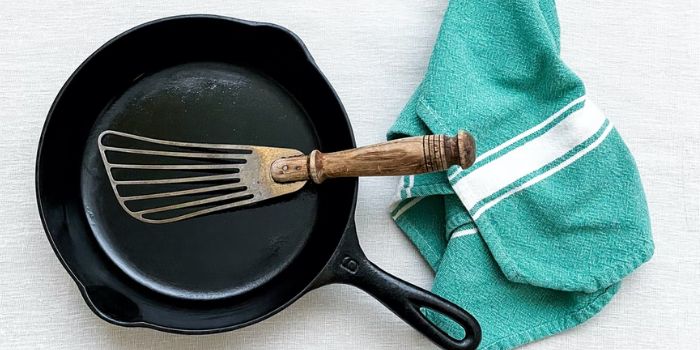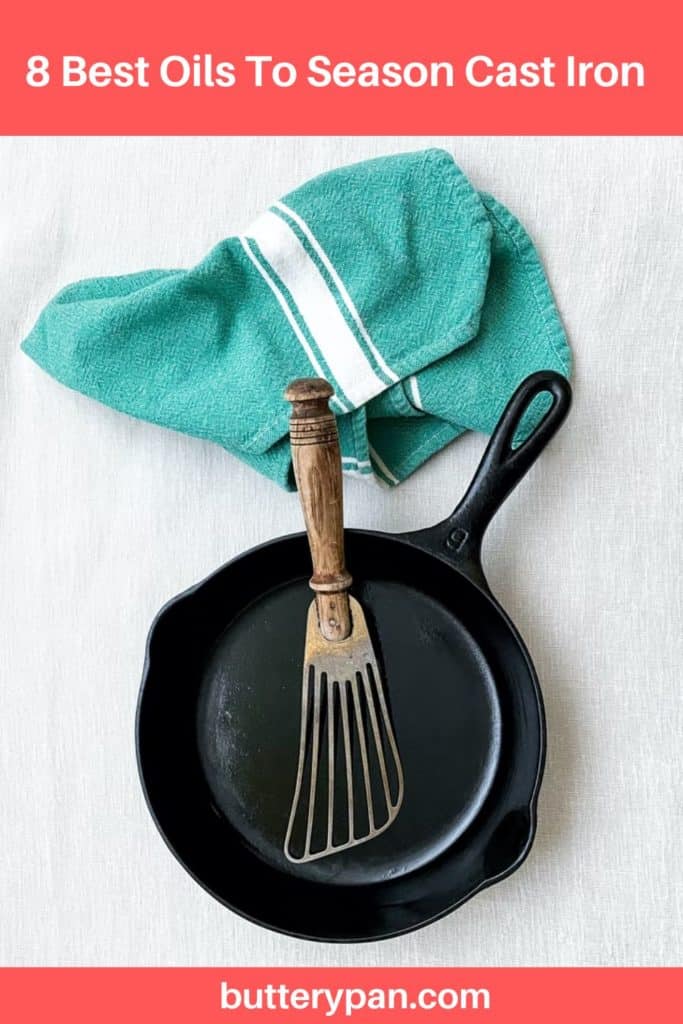8 Best Oils To Season Cast Iron

The best oil to season cast iron? Because of its high smoke point and versatility, grapeseed oil is the best oil to season cast iron skillet. You can also choose other oils for seasoning cast iron skillet, such as peanut oil or vegetable oil.
Cast iron skillet and cast iron cookware, in general, is something that can last you a lifetime, or even be used throughout multiple generations. However, you need to care for this cookware properly, and the first step is seasoning it before its first use.
In this article, we will go over the best oils for seasoning cast iron skillets, the reasons why seasoning cast iron skillets is so important, and how to properly season cast iron skillets. Keep reading to learn more!
Table of Contents
Best Oil To Season Cast Iron?

The grapeseed oil is the best oil to season cast iron skillet. There are many benefits to using grapeseed oil for seasoning cast iron skillet, the biggest benefit being its high-smoke point of 420 degrees F. It is relatively inexpensive, which is another benefit.
Finally, grapeseed oil has a mild flavor that blends well with any dish you plan to cook in your cast iron skillet. This is very important, as you don’t want the oil to overpower the other ingredients and ruin your dish.
However, be aware that there are cold-pressed and virgin varieties of grapeseed oil, which have a lower smoke point, which makes them unsuitable for seasoning cast iron skillets.
What Is Seasoning?
Seasoning cast iron skillets means covering them with a thin layer of cooking oil in order to fill tiny pores on the surface of any cast iron pan, skillet, or any other cast iron cookware.
How To Season Cast Iron Skillet
Your cast iron skillet needs to be clean before seasoning. Wash it thoroughly and dry it quickly with a paper towel. Rub the clean cast iron skillet with grapeseed oil all over and bake in the oven at 450 degrees F for half an hour.
There seems to be a disagreement over how often you should season your cast iron skillet, and if you need to season cast iron at all after the first time. The rule of the thumb suggests that you re-season your cast iron skillet when you notice food sticking to it while cooking.
There are also other tips related to seasoning cast iron skillets. After the initial seasoning process, it is recommended that you use your cast iron skillet for cooking fatty meats and oily foods for the first few uses.
Also, avoid cooking delicate foods in your cast iron pan, such as eggs and fish, at least until you used your cast iron skillet for 10 times already. Another thing to avoid is acidic foods, such as wine, vinegar, citrus fruits, and even tomatoes.
Always use hot water for washing your cast iron pans, and don’t ever soak them. Only use dish soap when you cooked something that was very aromatic. After each washing, dry the cast iron skillet quickly and thoroughly and buff it with a small amount of seasoning oil.
Why Should You Season Cast Iron Skillet
The reasons for seasoning cast iron skillets are numerous, the first one being that this way, food won’t stick to the cast iron skillet while cooking. Another reason is that with a seasoned cast iron pan, you will need less oil to cook your meals, which means less calorie intake.
Food cooked in a seasoned cast iron skillet will be more delicious. the seasoning in the cast iron skillet absorbs flavors from one meal and imparts them when another meal is cooked, giving your food a delicious and complex taste.
What Is The Best Oil To Use For Seasoning Cast Iron?
Grapeseed oil is by far the best choice for seasoning cast iron skillets, but many other alternatives are being used instead, so let’s take a quick look at the pros and cons of using each one of them:
- Flaxseed oil is a popular choice for cast-iron seasoning oil. Flaxseed oil is used mainly because it makes cast iron surfaces smooth and hard, making them resistant to scratches and wearing.
However, flaxseed oil has a very low smoke point of only 225 degrees F, which makes it not so good for cooking at high temperatures. It is also relatively expensive, and it quickly goes rancid. - Avocado oil is also used as oil for seasoning cast iron cookware because it has a high smoke point of 520 degrees F, long shelf life, and makes a tough coat of seasoning on cast iron pans and skillets.
Although it sounds perfect, avocado oil has a huge drawback – it is significantly more expensive than most other cooking oils. - Canola oil can also be used for seasoning cast iron skillets, but it won’t yield as good results as the options above. The first canola oil seasoning might create a bumpy surface, and it will be overall weak, with food starting to stick much sooner than with some other cooking oils.
Not everything is bad when it comes to canola oil though. This type of vegetable oil has a relatively high smoke point of 400 degrees F, and it is insanely cheap. - Olive oil is something you should never use to season cast iron cookware. We only included it in our list to warn you how bad it is for seasoning cast iron skillets, despite its low price and well-known health benefits.
Even the extra virgin olive oil is a bad choice because of its low smoke point of 375 degrees F, and it can release harmful chemicals when burning. - Similar to canola oil, sunflower oil has a high smoke point of 450 degrees F and a light flavor that won’t compete with the other ingredients.
However, this vegetable oil is weak when used as a cast-iron seasoning oil, and you will need to re-season more often than with other choices. - Coconut oil has a delicious flavor and a high smoke point of 450 degrees F, but we advise you against using coconut oil for seasoning cast iron skillet.
Coconut oil is rich in saturated fats which means the seasoning won’t harden well. Virgin coconut oil has a much lower smoke point of 350 degrees F. Coconut oil flavor might not go so well with some dishes. - Peanut oil also has a distinct flavor that might overpower and ruin some dishes when being used as a seasoning for cast iron skillet. Also, seasoning your cast iron skillet with peanut oil might be dangerous if you use that same skillet to cook for someone who has a peanut allergy.
On the other hand, peanut oil is relatively inexpensive, and it has a high smoke point of 450 degrees F. - Finally, bacon grease is also used for seasoning cast iron pans, and it has its own set of pros and cons. Bacon grease will keep your cast iron skillet non-sticky and smooth, but its flavor might be overpowering for some dishes.
Also, it is needless to say that cast iron skillets shouldn’t be seasoned with bacon grease if you plan to use them for cooking vegan and vegetarian meals. in that case, make sure to use vegetable oil instead.
Is Olive Oil Good For Seasoning Cast Iron?
Olive oil has plenty of health benefits and it is probably the most widely used cooking oil in the world. But, if you wonder if you can use olive oil for seasoning cast iron skillet, the answer is absolutely not.
You can use olive oil when cooking your meals, but don’t use it to season cast iron pan. Olive oil has a low smoke point and can release harmful carcinogenic chemicals when burning. So, avoid it at any cost when seasoning cast iron skillet.
What Oil Is Best For Cast Iron Skillets?
Now that we went over several options for seasoning cast iron skillets, we can safely say that grapeseed oil is the best for cast iron skillets. Grapeseed has a high smoke point, it is quite cheap, goes well with any dish, and it will make your cast iron skillet smooth and non-sticky.
You can use other options instead of grapeseed oil for seasoning cast iron skillets, but each one of them has some flaws that make it inferior when compared to grapeseed oil.
If you don’t mind its price, avocado oil is the best alternative to grapeseed oil when it comes to cast iron seasoning oils. It has a high level of unsaturated fats crucial for cast iron seasoning, and a high smoke point.
Can I Season Cast Iron With Coconut Oil?
You can use coconut oil to season the cast iron pan, but it’s not the best choice. Virgin coconut oil has a low smoke point of 350 degrees F, and its distinct flavor might not go so well with many dishes.
Refined coconut oil has a higher smoke point of 450 degrees F, but it is also high in saturated fats, which lowers the polymerization that’s required for the seasoning process, and as a result, the seasoning won’t harden well.
Related Posts
Summary
Now you know what’s the best oil to season cast iron. Grapeseed oil takes the gold medal, and if it wasn’t so expensive, avocado oil would also be a great option for seasoning cast iron skillet.
Some other options include sunflower vegetable oil, canola oil, flaxseed oil, coconut oil, peanut oil, etc. You should never use olive oil for seasoning cast iron skillet because it is the worst option available.
In this article, you learned not only which oils can you use for seasoning cast iron skillets, but you also learned what does seasoning process do, and why is it so important.